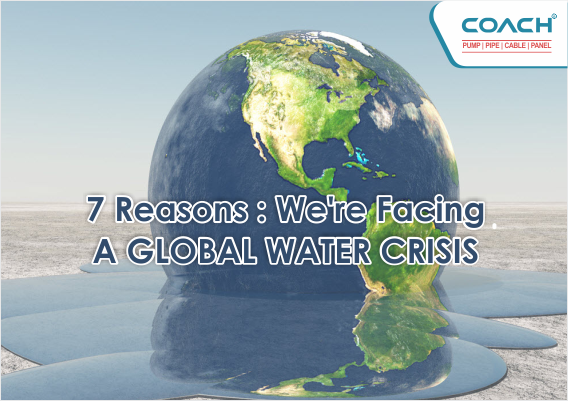7 Reasons We're Facing a Global Water Crisis
- May 25, 2023
- Category :Uncategorized

Introduction:
Water is a vital resource necessary for life, agriculture, industry, and economic development. However, the world is currently facing a looming water crisis characterized by scarcity, pollution, and mismanagement. In this blog post, we will explore seven key reasons contributing to the global water crisis and the urgent need for sustainable water management practices.
- Population Growth:
The global population continues to grow rapidly, leading to increased water demand for domestic, agricultural, and industrial purposes. The rising population puts immense pressure on water resources, straining existing supplies and exacerbating water scarcity issues.
- Climate Change:
Climate change is altering weather patterns, resulting in irregular rainfall, droughts, and extreme weather events. These changes disrupt water availability and exacerbate water scarcity, particularly in regions already prone to arid conditions. Additionally, melting glaciers and polar ice caps contribute to rising sea levels, further contaminating freshwater sources.
- Water Pollution:
Industrial activities, inadequate sanitation systems, and improper waste disposal practices contribute to water pollution. Pollutants such as chemicals, heavy metals, and pathogens contaminate water bodies, making them unfit for human consumption and harming ecosystems. Water pollution reduces available freshwater resources and poses significant health risks.
- Inefficient Water Management:
Inefficient water management practices, including over-extraction, inefficient irrigation methods, and inadequate infrastructure, result in significant water loss and wastage. Outdated distribution systems and lack of investment in water infrastructure further compound the water crisis, limiting access to clean water for many communities.
- Agricultural Water Usage:
Agriculture is a major consumer of water, accounting for a significant portion of global water usage. Inefficient irrigation techniques, such as flood irrigation, lead to excessive water consumption. Promoting sustainable agricultural practices, such as drip irrigation and precision farming, can help reduce water usage and improve efficiency.
- Urbanization:
Rapid urbanization increases water demand for domestic and industrial purposes. As cities expand, the strain on water resources intensifies. Urban areas often face challenges in managing wastewater and stormwater runoff, leading to pollution and reduced water availability.
- Geopolitical Tensions:
Water scarcity can escalate geopolitical tensions between countries sharing transboundary water sources. Disputes over water rights and access can lead to conflicts, further exacerbating the global water crisis. Effective cooperation and diplomacy are essential for managing shared water resources and ensuring equitable access.
Conclusion:
The global water crisis is a complex and multifaceted challenge that requires immediate attention and concerted efforts. Population growth, climate change, water pollution, inefficient water management, agricultural water usage, urbanization, and geopolitical tensions all contribute to the crisis. To address this issue, we must adopt sustainable water management practices, promote water conservation, invest in water infrastructure, and implement policies that prioritize equitable access to clean water. Collaboration between governments, organizations, and individuals is crucial to securing a sustainable future with an abundant supply of clean water for generations to come.






